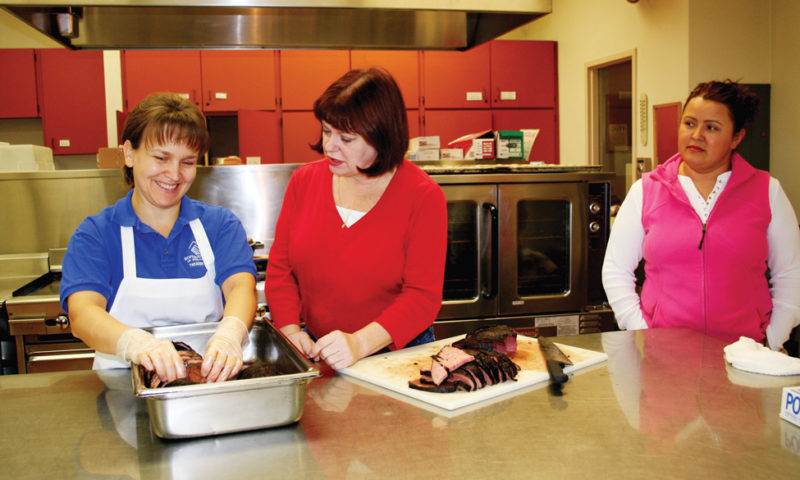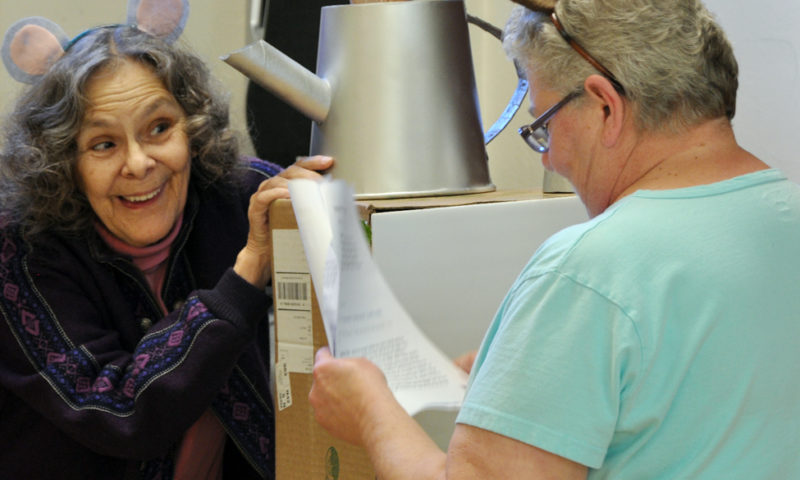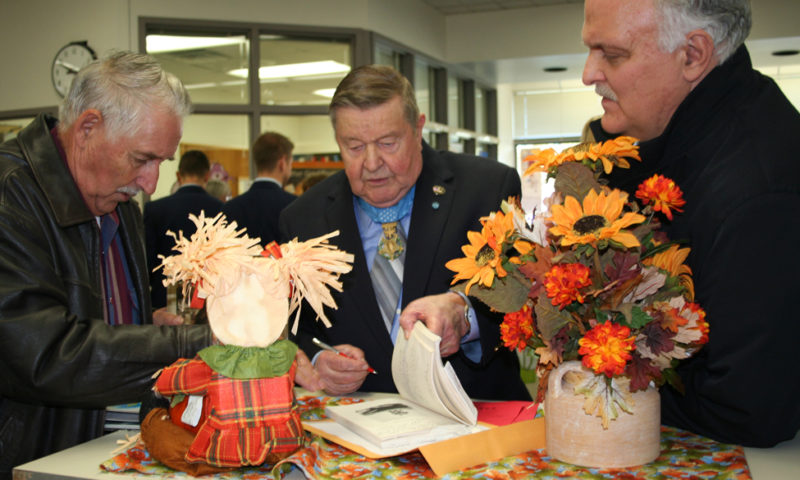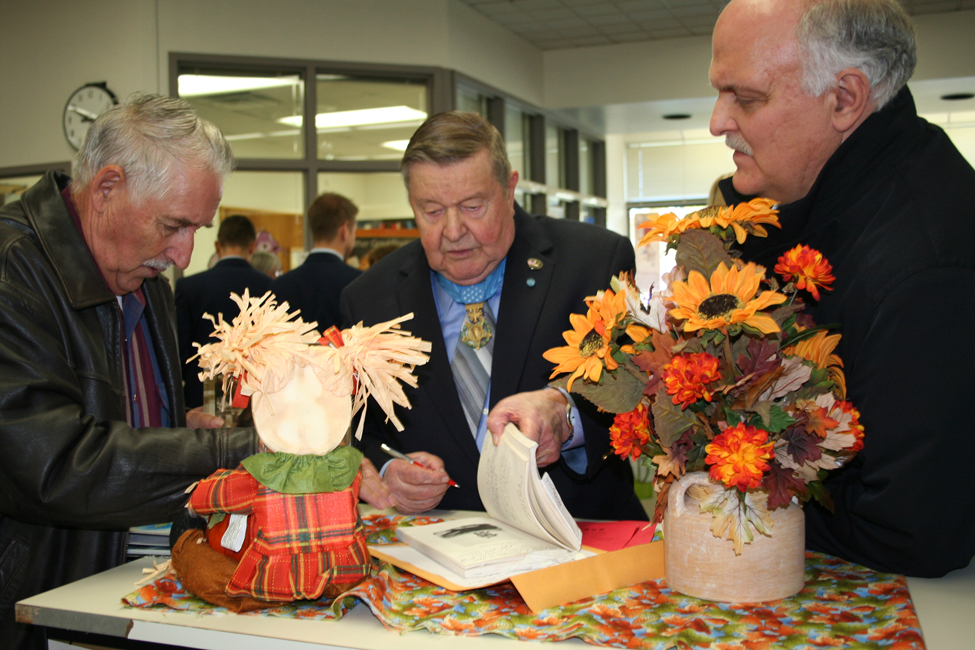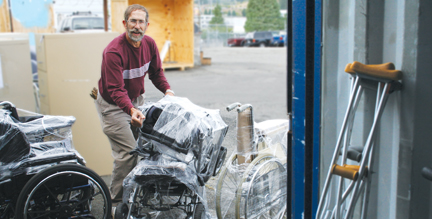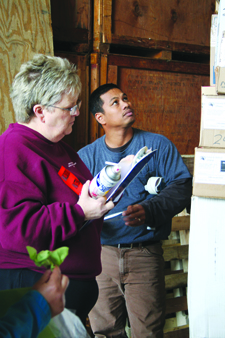Long time advocate for senior services retires

- Michele Williams (center) talks to Lighthouse cook, Nadezda Litvin (left) about a meal while Grace Morales looks on. Williams said that one of the requirements for her job when she was initially hired was that she be certified as a Boiler Operator. “It was the hardest thing I ever did,” she said when she talked about her training to be certified.
It’s 8:30 Monday morning and already the phone’s strident ring can be heard throughout the entire Lighthouse Activity Center. While it never rings for long, it rings relentlessly like a broken school alarm, it’s blare only drowned out by the commotion and clash of exercise classes and dozens of voices. Michele Williams, the queen of all this hustle and bustle moves quickly through each minor disaster and momentary angst with a gentle touch and a quick smile.
The Lighthouse Senior Activity Center started out life as a Mormon church. The city bought it in 1981 but Williams still gets Mormons looking to tour the old church and loves that part of the building’s history. When the city took over the building, the Red Cross and the meal site shared it and eventually the Red Cross left. “The center used to be like a mini Boys and Girls Club,†says Williams. Widowed men, uncomfortable with the quiet of being alone at home and by nature not as social as their widowed women counterparts, hung out at the center. Over time the push has been to make programs more intentional—focusing on healthy older adults and offering group activities such as dance that are tailored for individuals. Williams is proud of the work the center has done.
She encourages a group of seniors to put down a deck of cards and go make Christmas stockings, “Carol in room six…they’re making free Christmas socks downstairs,†she hollers over to them. Someone makes a comment about it might be fun. “Well get down there,†she answers back.
“I ain’t got time,†says another.
“Oh, you got time, honey,†she laughs at her.
She jumps up to suggest a change to the center’s new cook and checks in on the exercise class with a quick stop to pass a private joke with a woman in her 90s that leaves the ones in on the joke slapping their thighs while everyone else just smiles. She’s quick and efficient like you can only be when you have dozens of years of experience under your belt. At the end of December, the queen abdicates her throne. Williams, who has been at the center for 32 years says one of her clients has been with her for 25 years. She’s working with the fourth generation of another family. “That means I’ve been here too long,†she says with a bittersweet smile. She muses, “Where did it go?â€Â She dabs at brimming eyes and reflects on memories—good memories she’s been happy to be part of. “They’re not my participants. They’re family. Family calls me from out of town. I know everybody by first name. I know who their kids are…their dogs’ names. That’s my honor—to work with them. The best part is so much sharing.â€
Williams decided in early December to accept an early retirement when Tacoma employees were informed that many of them faced layoffs as the city deals with a $23 million budget deficit. The center’s employees and clients are still reeling from the shock.
Cindy Rieger, the center’s van driver calls Williams, “the best boss I’ve ever had. She’s incredible.â€Â Rieger has worked at the center for two years and says that Williams’ generosity of spirit extends beyond the clients. “It’s not just the seniors, it’s every one of us.â€
Bob Riler, Community Outreach and Education Specialist with Pierce County, is a frequent contributor to many of the center’s awareness programs including a senior providers meeting Williams hosts each month.  “There are few people as skilled as Michele Williams,†he says. “She has a thorough knowledge and understanding of community resources that complements her passion for the needs and concerns of older adults. She is one-of-a-kind and will be sorely missed.â€

Carol Maddox, who teaches quilting classes, says that Williams’ has been a major force in her work. “She’s got my creative juices going,†says Maddox. “It’s been fun. I’m going to miss her in a big way.â€
Williams jokes that when she retires she’s going to clean her basement, organize her house…then stops and shakes her head with a little laugh. “I have a fourth granddaughter coming in April and I want to work for Mary Bridge (in their hospice program for children with cancer).â€
She muses, “Thirty years. Where did it go? I would still like to not retire. I have to have another door open. I can’t see myself watching The View or Bob Barker. You have to have a purpose in life. If you don’t, life just goes away.â€
